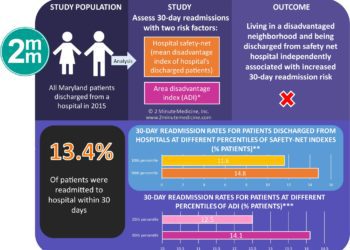Pediatric readmissions likely a poor proxy for hospital quality
Image: PD
1. Pediatric hospital readmissions within 30 days for common inpatient conditions remain below 10%.
2. Stratification of hospital performance by pediatric readmissions is difficult as low volumes of patients with specific clinical conditions are seen.
Evidence Rating Level: 2 (Good)
Study Rundown: Preventable hospital readmissions have become a cornerstone of health care policy, both to improve patient care and to better allocate financial resources. Literature on readmissions in the adult setting is abundant, which resulted in Medicare financially penalizing hospitals with readmission rates above national benchmarks starting this year. These penalties are condition-specific; for example, hospitals with readmission rates of pneumonia higher than the 18.5% national benchmark are disciplined financially. However, pediatric readmissions have not been thoroughly investigated. This study evaluated readmission and revisit rates for the most common inpatient pediatric conditions using a national database. The database included a subset of hospitals that tended to be larger, urban, and served a higher percentage of Medicaid patients than national averages. The study found that the volume of patients seen at individual hospitals is too small to allow for performance stratification by condition. As such, evaluating hospital performance using pediatric readmissions as a proxy, similar to adult medicine, is inadequate. Further analyses with grouping of similar clinical conditions is indicated to evaluate pediatric readmissions as a possible quality marker for hospitals.
Click to read the study, published today in Pediatrics
Relevant Reading: Hospital Utilization and Characteristics of Patients Experiencing Recurrent Readmissions Within Children’s Hospitals
Study Author, Dr. Naomi S. Bardach, MD, MAS, talks to 2 Minute Medicine: Department of Pediatrics, University of California San Francisco
“As a national way of assessing and tracking hospital quality, pediatric readmissions and revisits, at least for specific diagnoses, are not useful to families trying to find a good hospital, nor to the hospitals trying to improve their pediatric care. Measuring and reporting them publicly would waste limited hospital and health care resources.”
In-Depth [retrospective study]: This study evaluated 958 hospitals from the State Inpatient and Emergency Department Databases of the Healthcare Cost and Utilization Project. Seven of the most common diagnoses, as determined by the Agency for Healthcare Research and Quality’s Clinical Classification Software, were examined for children aged 1-20 years. These included appendicitis, asthma, dehydration, epilepsy, mood disorders, pneumonia, and skin infections. Revisits were defined as either readmission or visit to the Emergency Department. Both readmissions and revisits were analyzed for 30- and 60-day intervals from initial presentation. At 30 days, all conditions had readmission rates less than 10% and revisit rates less than 11%. Most hospitals had low numbers of condition-specific visits. Only mood disorder revisit rates differed significantly from the mean. This homogeneity between hospitals, possibly complicated by small sample size per condition, limited the use of pediatric readmission rates as a proxy for hospital quality.
By Neha Joshi and Leah H. Carr
More from this author: Quality improvement methods increase adherence to pediatric UTI guidelines, Inhaled nitric oxide in premature infants shows no benefits, Intrapartum maternal asthma linked to increased disease in children, Racial differences noted in autism care, Short term zinc prophylaxis decreases infant diarrhea mortality
© 2013 2minutemedicine.com. All rights reserved. No works may be reproduced without expressed written consent from 2minutemedicine.com. Disclaimer: We present factual information directly from peer reviewed medical journals. No post should be construed as medical advice and is not intended as such by the authors, editors, staff or by 2minutemedicine.com. PLEASE SEE A HEALTHCARE PROVIDER IN YOUR AREA IF YOU SEEK MEDICAL ADVICE OF ANY SORT.







